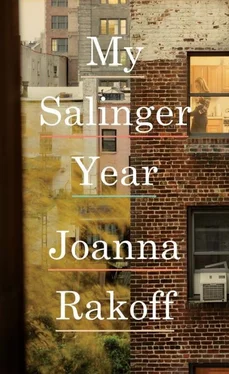“It was stupid, though.” He took my arm again, and we continued walking across North Ninth Street toward Macri Triangle, a grubby patch of grass overrun with rats that was somehow considered, by the City of New York, an official public park. “I couldn’t make the payments, so I deferred. You can keep deferring. You just have to do all this paperwork every six months. I got sick of doing the paperwork.”
I was thinking about the rent. The truth was I didn’t really understand how Don made a living. He seemed to spend most of his time at the gym—he was a boxer, “like Mailer,” as he said, “but better”—or in cafés, working on a novel that was, he said, nearly done. In the past, he’d taught English as a second language to adults—immigrants from Russia and Latin American housewives—but now he had just a few private students. He always seemed to have money for wine or coffee, but he also—I was noticing—doled out cash with strict discipline. He didn’t use credit cards. And now I knew why.
“I mean, college should be free anyway,” he was saying. “In Europe nobody pays twenty grand a year for a BA. All my European friends think Americans are crazy .” Don’s European friends occasionally came up in conversation, but they’d yet to materialize in real life. The friends we saw regularly were largely from New York and Hartford, where Don grew up, and San Francisco, where he’d lived until a year or so prior. Most had indeed attended colleges where tuition exceeded twenty grand per year. His friend Allison had grown up in a town house on the Upper East Side—the daughter of a famous writer and a powerful editor—and gone to Bennington with Marc, his best friend from Providence, the child of academics. Like Don, they strove to shake the trappings of their privileged childhoods: Allison lived in a garret-like studio on Morton Street and complained of poverty but ate out every night. Marc had abandoned his expensive education to train as a cabinetmaker. Now he ran a high-end contracting business out of his loft on Fourteenth Street, a not-insubstantial piece of real estate.
“Was there something strange about that apartment?” I asked.
“The floor tilted a little.” He shrugged, then put his arm around me and drew me close. “But who cares. We’re not going to find another apartment for five hundred bucks a month. Right by the train. Right by everything. And that’s a beautiful block, North Eighth. All the trees.”
“The trees,” I repeated, smiling, though all I could recall about them was the dusty shadows they’d thrown on the snow.
When we got home, we found Leigh and Pankaj sitting at the table drinking beer with Allison and Marc, whom Don had apparently invited over and forgotten about—or forgotten to tell me about. I liked both of them—far more than most of Don’s friends—but I was exhausted. “Donald!” Leigh cried. The hand she raised in greeting was still bandaged. “Joanna! Come have a beer with us. We’re celebrating.” Rising from her chair, she placed her warm cheek on my cold one. She was wearing one of her beautiful dresses—a deep maroon crepe with tiny covered buttons down the front—and a full face of makeup: foundation, which smoothed the pits and ruts on her chin, and mascara, which gave her actual eyelashes, and a deep red lipstick. Her hair, too, had been washed and blown into shiny waves. She looked not just presentable but gorgeous. “I have a job.”
“Wow,” I said. I’d not actually thought her capable of finding employment. “What kind of job?”
“Who cares?” called Allison gleefully, clinking beers with Pankaj, who merely smiled. He was still wearing his unlined army coat, a scarf wrapped around his neck, though the apartment was stifling at the moment. I tried to catch his eye. We’d been through something together, I thought, we had a special understanding. But he looked down at the table, at his lap, the beer. “Hey, man,” he finally said to Don. “How’s the party?”
A few minutes later, he and Leigh disappeared. First him, then her. “I’m going to change,” she said. “I’ve been in these clothes all day.”
“Hey,” I called after her. “Guess who’s a client of my Agency?”
“Thomas Pynchon,” answered Allison, sipping wine out of a large blue goblet. It was the only vessel in the apartment resembling an actual wineglass, and Allison always claimed it when she came to visit.
“Close,” I said. “J. D. Salinger.”
The room fell into stunned silence. Allison, Marc, and Don stared at me, openmouthed. “Here,” Marc said finally, pushing a beer in my direction.
“ J. D. Salinger?” asked Don, finally, shaking his head in disbelief. “For real?”
I nodded. “He’s my boss’s client.”
Suddenly everyone was talking at once.
“Did you speak to him?” asked Marc. “Did he call?”
“Is he working on a new novel?” asked Allison, her lips ghoulishly purple with wine. “I’ve heard stories—”
“How old is your boss?” asked Don. “Didn’t Salinger start writing stories in, like, the ’40s?”
“Was he nice?” asked Allison. “People get so angry about him, but I always got the feeling that he was really nice, that he truly just wanted to be left alone.”
“He’s a fucking phony,” said Don with a smile.
Marc narrowed his eyes, annoyed. “You’re kidding, right?” he said, taking a swig of beer. “Just because he wants to be left alone doesn’t mean he’s some kind of fraud.” Like Don, Marc was short and muscular and possessed of a certain intensity. He had the looks of a 1970s film star: blue eyes, chiseled jaw, long nose, wavy blond hair. Looks so stunning that even men commented on them. His fiancée, Lisa, was oddly plain—unusually plain—and as silent and reserved as Marc was garrulous and open. These were just a few of the grounds on which Don objected to her. He was convinced Marc would call off the wedding.
“My friend Jess worked at Little, Brown a few years ago”—Allison looked at Marc—“Salinger’s publisher you know?” Marc nodded. “She was just an assistant and she had nothing to do with Salinger, with the Salinger books. But her desk was near the reception area, and one night she was working late and the main phone line just kept ringing and ringing and ringing. It was like nine thirty at night. Who calls an office at nine thirty, right? So finally she picked it up and there was someone screaming—like screaming —on the other end. Screaming, ‘THE MANUSCRIPT IS OKAY! I SAVED THE MANUSCRIPT!’ And something about a fire, and other stuff that she couldn’t understand. Just screaming . So she thought this was a crazy person, right?” We nodded. “The next day, she got to work and it turns out—”
“It was Salinger,” said Don.
“It was Salinger,” confirmed Allison, her cheeks hollowing in annoyance. “There’d been a fire at his house. His whole house had burned down. Or half his house. Anyway, his house was actually on fire when he called, but somehow he thought the most important thing was to call his publisher and let them know that his new book was okay. Like before even saving his family or calling the fire department.”
“How do you know he didn’t save his family or call the fire department first?” asked Don.
“Jess told me,” said Allison.
“Why is it crazy to call your publisher and let them know your manuscript hasn’t been destroyed in a fire?” Don persisted.
“That’s not the crazy part, Don,” Allison groaned. “He called in the middle of the night, when no one was there. He assumed that the people at Little, Brown knew that there was a fire in some small town in New Hampshire—”
“You know what?” Don’s gravelly voice had grown raspier with drink. “This sounds like bullshit to me. Salinger’s not working on another book. Why should he? What is he now, a millionaire how many times over? Your friend just made this all up.”
Читать дальше












